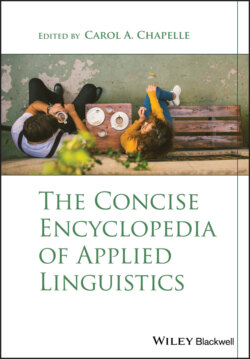Читать книгу The Concise Encyclopedia of Applied Linguistics - Carol A. Chapelle - Страница 142
Future Directions in Second Language Reading Assessment
ОглавлениеAssessment of reading in a second language has taken shape following the principles in test development in language assessment. The tradition has resulted in heavy emphasis on language‐specific skills in the target language, and, as its corollary, scant regard for nonlanguage‐specific resources available in the learner's first language. Future agendas can be built to tackle these and other complexities arising from the involvement of two languages in second language reading.
One way of addressing crosslinguistic issues in reading assessment is to incorporate predictable variations induced by first language reading skills and other resources. Over the last three decades, research has shown that previously acquired skills variably affect second language reading development. To date, however, we know little about how such variations alter assessment outcomes and their interpretation. As a case in point, it is widely recognized that decoding competence develops at disparate rates in learners with diverse first language orthographic backgrounds, but it is not well understood how such disparity predicts speed and accuracy of text comprehension among linguistically diverse learners. Thus, we have yet to know to what extent and how facilitation stemming from transferred first language skills in one operation enhances the execution of other, later occurring, operations. In recent years, these complex issues have begun to attract attention among second language reading researchers. Findings from this research, if properly incorporated, could substantially improve interpretability of assessment outcomes, and, in so doing, enhance their utility in language classrooms.
Another way of increasing the legitimacy of second language reading assessment is to foster broad‐based reading ability by adopting the notion of student‐centered learning. Central to the student‐centered approaches is the principle that the exponential growth in knowledge—be it of language or content—occurs when the student is allowed to bring her personal experiences to the process of learning (Caccamise, Snyder, & Kintsch, 2008). The notion can be easily extended to the process of demonstrating progress in learning. Personalization is an optimal way of giving the student agency over learning. By broadening the conception of reading ability, assessment could serve as the catalyst for a shift of learning responsibilities from teachers to students—that is, the most fundamental commitment in student‐centered approaches.
In today's world, a large number of learners strive to read in a second, or a later acquired, language for learning new concepts. Despite its centrality in deeper text understanding, the capacity for personalizing text information has attracted far less attention than it deserves in second language reading assessment. As a process of connecting text information with the reader's knowledge, personalization allows the second language learner to build links between linguistic and nonlinguistic resources in two languages, and thus, promotes the ability to use language autonomously for meaning making. This ability in turn supports exponential growth of vocabulary and other facets of linguistic knowledge during reading. Obviously, we have much to gain from adopting the notion of broad‐based reading ability in second language instruction and assessment.
SEE ALSO: New Literacies of Online Research and Comprehension; Uses of Language Assessments; Validation of Language Assessments
